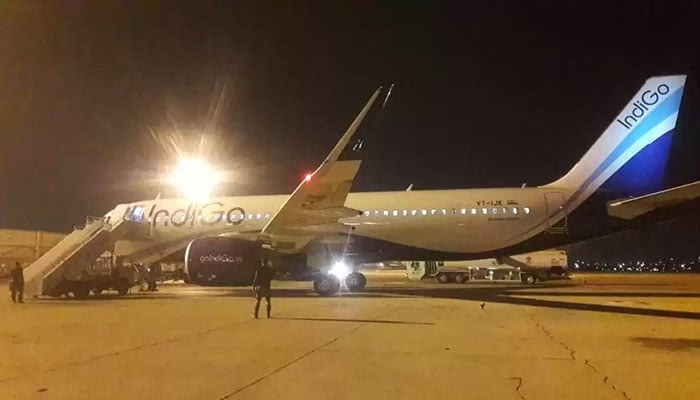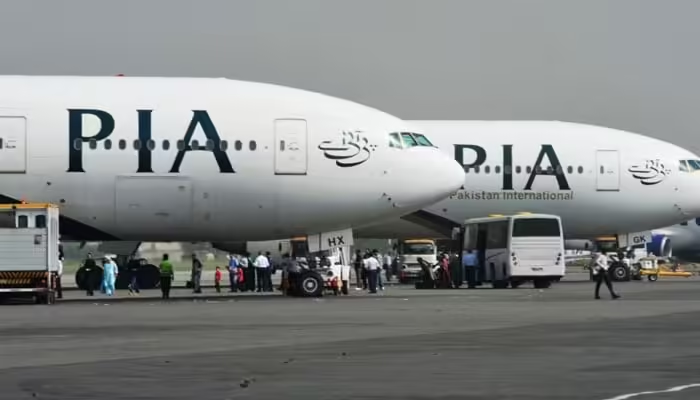In a rare and compassionate gesture, an Indian Airlines flight traveling from Delhi to Jeddah was allowed to make an emergency landing at Karachi’s Jinnah International Airport. The incident, which unfolded on humanitarian grounds, underscores the universal priority of saving lives, transcending borders and politics.
Medical Emergency on Board
The emergency unfolded mid-flight when a male passenger aboard the Delhi-to-Jeddah flight experienced severe health complications. According to aviation sources, the passenger’s condition began deteriorating rapidly as the aircraft entered Pakistani airspace. The flight crew promptly administered oxygen, but their efforts proved insufficient.
Realizing the urgency of the situation, the pilot made an emergency request to Karachi Air Traffic Control (ATC) for a landing. Demonstrating quick coordination, Karachi ATC granted permission for the emergency landing without delay.
Emergency Landing at Jinnah International Airport
Upon receiving clearance, the Indian pilot redirected the aircraft towards Karachi. The plane landed safely at Jinnah International Airport, where a medical team from the Pakistan Civil Aviation Authority (PCAA) was already on standby.
Airport officials confirmed that the PCAA team immediately boarded the aircraft to assess and provide medical aid to the passenger. The swift action of the ground staff and medical team played a pivotal role in stabilizing the passenger’s condition.
A Display of Humanitarian Spirit
The incident highlights the importance of humanitarian values in aviation, where the safety and well-being of passengers take precedence over all else. Despite strained diplomatic relations between India and Pakistan, the swift cooperation between the Indian pilot and Pakistani authorities ensured timely medical assistance for the ailing passenger.
Behind the Scenes: How Emergencies Are Managed in Aviation
Aviation emergencies require precise coordination and quick decision-making. When a medical emergency occurs, pilots assess the nearest airports where immediate assistance can be rendered. In this case, the proximity of Karachi’s Jinnah International Airport and the efficiency of Karachi ATC were instrumental in averting a potential tragedy.
The Role of Air Traffic Control
Air Traffic Control plays a critical role in facilitating emergency landings. Karachi ATC’s prompt approval not only enabled the flight to land safely but also showcased Pakistan’s commitment to international aviation protocols and humanitarian aid.
Responses to the Incident
The news of the emergency landing drew praise from both sides of the border, with many acknowledging the importance of setting aside political differences in times of crisis. Passengers on board expressed relief and gratitude for the swift actions taken by the pilot, Karachi ATC, and the medical team.
Social media users in both countries lauded the gesture, emphasizing the need for cooperation and compassion in similar situations.
Why Medical Emergencies Are Critical in Aviation
Medical emergencies in aviation can range from minor issues to life-threatening situations. Airlines are equipped with basic medical kits, and flight crews are trained to handle common emergencies. However, certain conditions require immediate professional medical care, making emergency landings crucial.
In this instance, the timely landing and the availability of medical assistance likely prevented a worse outcome for the passenger.
A Lesson in Humanity
The emergency landing of the Indian Airlines flight at Karachi’s Jinnah International Airport serves as a poignant reminder of the shared values that unite us as humans. While political divides may dominate headlines, incidents like these highlight the universal priority of saving lives and extending help to those in need.
The collaboration between the Indian pilot and Pakistani authorities not only ensured the safety of the passenger but also set a precedent for handling emergencies with compassion and efficiency. This humanitarian act will be remembered as a testament to the power of cooperation and kindness in aviation.



